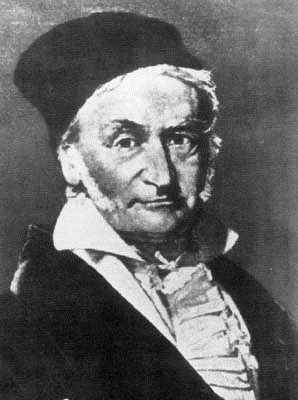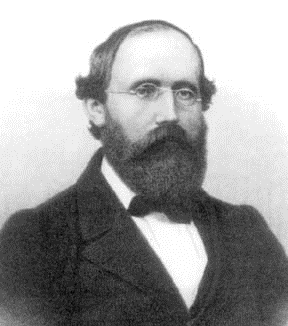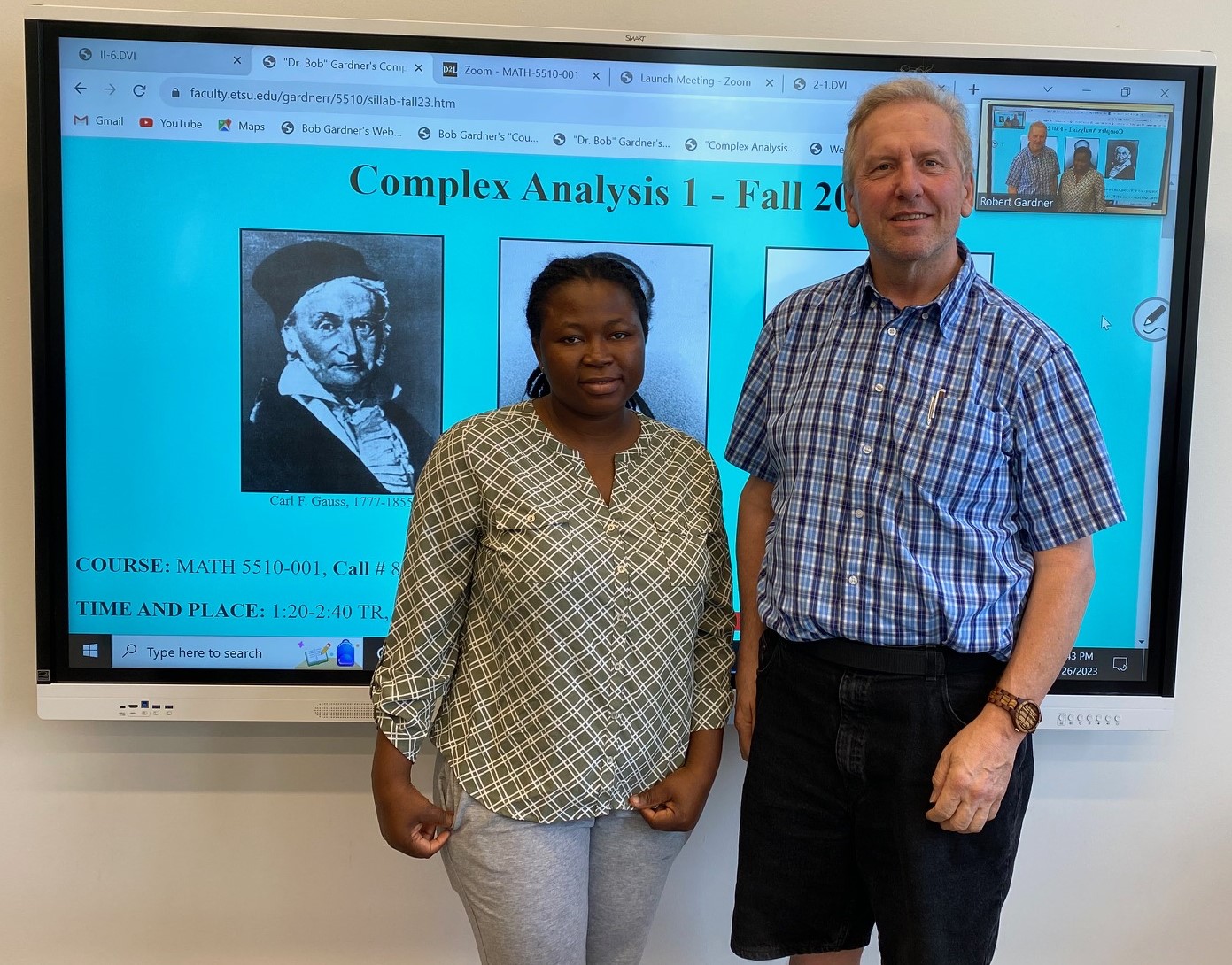 Carl F. Gauss, 1777-1855 |
 Augustin L. Cauchy, 1789-1857 |
 G. F. Bernhard Riemann, 1826-1866 |
 Carl F. Gauss, 1777-1855 |
 Augustin L. Cauchy, 1789-1857 |
 G. F. Bernhard Riemann, 1826-1866 |

COURSE: MATH 5510-001, Call # 84988
TIME AND PLACE: 1:20-2:40 TR, Gilbreath Hall room 313
INSTRUCTOR: Dr. Robert Gardner OFFICE HOURS: TR 4:15-5:00
OFFICE: Room 308F of Gilbreath Hall
PHONE: 439-6979 (308F Gilbreath), Math Department Office 439-4349
E-MAIL:gardnerr@etsu.edu
WEBPAGE: http://faculty.etsu.edu/gardnerr/gardner.htm
(see my webpage for a copy of this course syllabus, copies of the classnotes in PDF, and updates for the course).
TEXT: Functions of One Complex Variable, Second Edition, by John Conway.

PREREQUISITE: Formally, the prerequisite is an undergraduate real analysis class or advanced calculus class. Practically, what is necessary is some exposure to (and a reasonable recollection of) the topology of ℝ (open and closed sets, limit points, connectedness, compactness, completeness, lub and sup, glb and inf, sequences and series of real numbers, convergence, uniform convergence, comparison tests, Cauchy sequences), and properties of functions of a real variable (continuity, differentiability, power series representation). It is also assumed that the student has been exposed to some elementary properties of the complex numbers (algebra, geometry, roots of unity, modulus). Even some of the topics will be addressed in this class. You can find background material on Complex Variables (MATH 4337/5337) in my online notes for Complex Variables.
CLASS NOTES: We will use digital notes for the presentation of definitions, examples, and proofs of theorems. Copies of the Complex Analysis class notes are online. You should read the online notes to be covered in class before each class (to, at least, familiarize yourself with the definitions; we may not have class time to cover every little detail in the online notes). Try to understand the definitions, the examples, and the meanings of the theorems. After each class, you may need to read the section of the book covered in that class for a complete, deep understanding of the material.
ABOUT THE COURSE: Complex analysis is basically the study of analytic functions. As we will see, a function of a complex variable is often much better behaved than a function of a real variable! We will introduce the complex numbers as an extension of the real numbers. We explore the complex plane and give a geometric interpretation of results whenever possible. We study metric spaces in general, but with an eye towards the complex field. Analytic functions are defined, their series representations are explored, and Mobius transformation are analyzed. Finally, we introduce integration of complex functions, prove the Fundamental Theorem of Algebra, and the Maximum Modulus Theorem. If time permits, I will discuss some of my research results which are related to topics in the class. We may have the opportunity to briefly explore applications of this material, but this is definitely a pure math class and our concentration will be on theory.
OUTLINE:
Our tentative outline is:
Introduction. Introduction to Math Philosophy and Meaning, formalism, David Hilbert, Gottlob Frege, Bertrand Russell, Principia Mathematica, Russell's Paradox, Kurt Godel, well-formed formulas, complete axiomatic systems, undecidability, misinterpretations of undecidability, Adam Sokal, Peano's axioms of arithmetic.
Chapter I. The Complex Number System: Introduction to the
complex plane, real and imaginary parts, modulus, polar representation,
extended complex plane, Riemann sphere.
Chapter II. Metric Spaces and Topology of ℂ: Extensions of
several ideas from ℝ to ℂ and other metric spaces, open and
closed sets, connectedness, sequences, completeness, compact sets,
continuity, convergence, uniform convergence.
Chapter III. Elementary Properties and Examples of Analytic
Functions: Series, convergence of series, differentiability, analytic
functions, mappings, Mobius transformations.
Chapter IV. Complex Integration: Riemann-Stieltjes integrals,
power series, zeros of analytic functions, Fundamental Theorem of Algebra,
Maximum Modulus Theorem, winding number, Cauchy's Integral Formula,
properties of path integrals, Open Mapping Theorem.
(My plan for Complex Analysis 2 [MATH 5520] is to cover chapters V, VI, VII, IX, and XI.)
GRADING: Homework (H) to be turned in will be assigned regularly. We will have no tests and your course average will be your homework average. Grades will be assigned based on a 10 point scale with "plus" and "minus" grades being assigned as appropriate. Based on the assignment of grade points by ETSU, the plus and minus grades should be given on a 3 point subscale. For example, a B+ corresponds to an average of 87, 88, or 89; an A- corresponds to an average of 90, 91, or 92; an A corresponds to an average of 93 to 100 (ETSU does not give A+ grades and the lowest passing grade in a graduate class is a C), etc. Remember that the lowest passing grade in a graduate course is a C, so you need an average of 73% on all assignments in order to pass this class.
HOMEWORK: YOU MUST SHOW ALL DETAILS ON THE HOMEWORK PROBLEMS!!! Justify every step and claim you make - this is how you convince me that you know what you are doing. You may find some answers online, but these rarely sufficiently justify all steps and are unacceptable as homework solutions. Homework will usually be due on Saturdays through DropBox in D2L. You will need to create PDFs of your homework to electronically submit it.
ACADEMIC MISCONDUCT: If you have any questions about the assigned homework problems, then I will try to address them in class. If you need additional information, then let me know. We can work it out through e-mail, Zoom, or in-person meetings in my office. You are not to collaborate with your classmates on homework! I expect that the work you turn in is your own and that you understand it. Some of the homework problems are fairly standard for this class, and you may find proofs online or in an online version of the solutions manual. The online proofs may not be done with the notation, definitions, and specific methods which we are developing and, therefore, are not acceptable for this class. If I get homework from two (or more) of you that is virtually identical, then neither of you will get any credit. If you copy homework solutions from an online source, then you will get no credit. These are examples of plagiarism and I will have to act on this as spelled out on ETSU's "Academic Integrity @ ETSU" webpage (last accessed 8/22/2023). To avoid this, do not copy homework and turn it in as your own!!! If your homework is identical to one of your classmates, with the exception of using different symbols/variables and changing "hence" to "therefore," then we have a problem! If you copy a solution from a solution manual or from a website, then we have a problem! I will not hesitate to charge you with academic misconduct under these conditions. When such a charge is lodged, the dean of the School of Graduate Studies is contacted. Repeated or flagrant academic misconduct violations can lead to suspension and/or expulsion from the university (the final decision is made by the School of Graduate studies and the graduate dean, Dr. McGee). During tests, I will "patrol" the room to make sure everyone is doing their own work and that phones are securely put away. Once you start a test, you must stay in the room until you complete it or until the class time is over. If you provide have a documented medical need to leave class during the test then this will, of course, be honored (provided you give me the documentation before hand).
DESIRE2LEARN: I will not rely on the Desire2Learn ("D2L") website for the posting of notes and supplements; all of this material is freely available on my faculty webpage and does not require a login. I will use D2L to collect homework (in DropBox) and to post your grades, homework solutions, and recordings of class lectures.
SYLLABUS ATTACHMENT: You can find an on-line version of the university's syllabus attachment (which contains general information concerning advisement, honor codes, dropping, etc.; accessed 8/22/2023). There is also an online ETSU Divisive Concepts Syllabus Statement (accessed 8/30/2023).
ZOOM AND REMOTE ATTENDANCE: A ZOOM meeting is set up for each lecture through D2L. I encourage you to attend the in-person lectures if possible, but if you need to attend though ZOOM then that is fine. In particular, if you are not feeling well the please do not attend class in person. You can ask questions through D2L and I will respond, just like in class. These ZOOM meetings will be recorded and posted on D2L. We have new technology in the Gilbreath Hall classrooms and there may be unforeseen technical problems at the beginning of the semester.
COVID-19 POLICIES FOR THIS CLASS: Due to personal heath concerns and concerns over spreading COVID-19, I will likely wear a mask during each class. This may result in somewhat muffled lectures, but all classnotes are online and the lectures will closely adhere to the notes.
IMPORTANT DATES: (see the official ETSU calendar and calendar with School of Graduate Studies deadlines for more details; accessed 8/22/2023):
OTHER RESOURCES: The following may be of interest:
HOMEWORK: The following homework is assigned:
Return to Dr. Bob's webpage
Last updated: December 2, 2023.